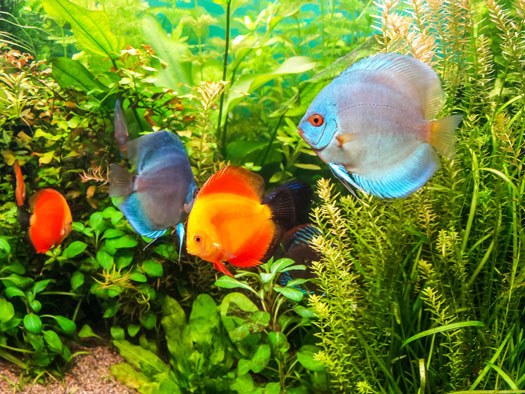- Your shopping cart is empty!
Why Are the Plants in My Aquarium Suddenly Dying?

For many aquarists, having saltwater or freshwater planted aquariums serves more than just aesthetic purposes. The natural beauty of aquatic plants is only secondary to the important role they play in balancing the ecosystem. Plants improve chemical oxygenation of water molecules, compete with algae for nutrients, and serve as a surface for Nitrobacter colonies to form. There’s no question that plants are win-win situations for fish keepers, but they also require a certain level of care in terms of nutrition and biochemistry. As organic species, plants will age, reproduce, wither, and cease to exist, but you shouldn’t see them perish at a very fast rate. If you see more than one of your aquarium plants dying at the same time, this could signal an imbalance of the ecosystem. Here are a few of the possible causes.
High Bioload
Even though plants can balance the biochemistry in a fish tank, there’s only so much they can do. In an overstocked aquarium where there’s more than an inch of fish per gallon of water, plants are bound to be affected by excessive breakdown of uneaten food and fish waste. Plants are excellent at handling nitrites and even carbon dioxide, but they won’t survive in highly sulfuric water, which can be produced by an accumulation of detritus and excrement.
Inadequate Substrate for Rooting Plants
If you have plants that need to root to survive, they may not be able to do so when the substrate consists solely of large rocks. Rooting plants require a finer substrate that won’t pressure the roots too much. When roots are unable to take hold, the growth of the plant will be stunted, thus leading to a premature death. We always suggest aquatic plant substrates if you’re going to have rooted plants in the aquarium.
Plant Destruction by Fish
In a tank filled with bottom dwellers and invertebrates, rooting plants will have a difficult time staying healthy because of constant nibbling. A school of neon tetras will have a field day with a single plant in a tank. In a reef tank filled with surgeon fish, chances are there will be no algae bloom because this species is known for its voracious feeding habits, but this could become problematic for plants when all algae is consumed. The most sensible solution is to keep numerous and various plants.
Poor Lighting Conditions
Photosynthesis is vital for healthy plant life. Placing a fish tank away from direct sunlight is a good idea because it can prevent algae bloom, but only if you can provide adequate lighting. The rule of thumb for most aquatic plants is to have an LED light that’s made for planted aquariums, and the lamps should stay on for at least eight hours to mimic the day cycle.
Whether you need beautiful plants for your tank or any supply that’s necessary to maintain your aquatic environment, you can find what you’re looking for at Aquatic Warehouse, a leading provider of aquarium and koi pond supplies. Stop by our store located in Kearny Mesa, order the supplies you need from our website, or give us a call at 858-467-9297 if you have any questions.
